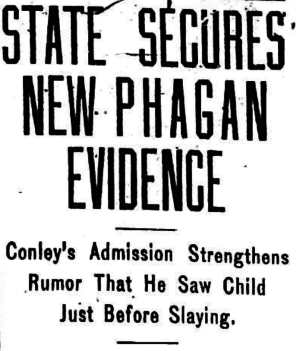State Secures New Phagan Evidence
The Atlanta Georgian
Saturday, June 28, 1913
[HOOPER SECURES NEW EVIDENCE FROM CONLEY]*
[NEW FACTS GIVEN BY NEGRO]
[Admissions to Prosecutor’s Aide Strengthens Rumor That He Saw Girl Just Before Crime.]
Conley’s Admission Strengthens Rumor That He Saw Child Just Before Slaying.
Frank A. Hooper, associated with Solicitor Dorsey in the prosecution of Leo M. Frank on the charge of strangling Mary Phagan, admitted Saturday that Jim Conley, negro sweeper at the National Pencil Factory, had made important additions to the story of his part in the murder mystery and had told of circumstances on the day of the crime which he had revealed in none of his previous statements.
A persistent report that Conley had made the startling admission that he had seen Mary Phagan enter the factory on the day she was slain arose at the time the negro was questioned more than an hour by Solicitor Dorsey early in the week, and this rumor was heightened after Attorney Hooper’s interview with the negro Friday.
In all of his statements to the detectives Conley denied he saw the girl at all on the day of the crime until he was horrified by the sight of her dead body lying in the rear of the second floor where he was directed by Leo Frank. Solicitor Dorsey is believed to have wrung the statement from him that he did see Mary Phagan when she came in the door of the factory and went to the second floor to Frank’s office.
Hooper Mum on Topic.
Mr. Hooper refused either to affirm or deny this report, declaring that his connection with the case was so recent that he would not be warranted in making any definite statement for publication in reference to the evidence in the possession of the prosecution.
His attention was called to the fact that while in all of the published statements of Conley the negro denied seeing Mary Phagan go into the factory, no one connected with the prosecution could now be induced to say that he still stuck to this particular and puzzling feature of his story. Mr. Hooper, however, would make no comment on the circumstance.
He contented himself with the general assertion that the State had a big stack of evidence of which the defense is in entire ignorance and of which they will remain in ignorance until it is presented when Frank is placed on trial for his life.
“I went to the police station yesterday merely for the purpose of having Conley rehearse his story to me,” said Mr. Hooper. “It is true that he told me of a number of circumstances of which I had been in ignorance before, circumstances which have a most important bearing on the case. He made additions to his story which, while they were along the same general line as his last affidavit, gave a detail that assisted me remarkably in getting a much clearer idea of the events as they happened on that day.
Will Be Revealed at Trial.
“I can not tell what they were. They will be revealed when the trial is in actual progress. Mr. Dorsey has guarded his evidence carefully and has refrained from trying his case in the papers. If it were not presumptuous for me to step in and give this evidence away to the public and to the defense it would at least be most unwise.
[“The negro appeared to be telling a straightforward story. He said nothing that caused me to alter my theory of the killing in the least. So far as I know, there never has been any serious doubt that those were bloodstains there on the second floor. I am confident that it was there that the attack was made. I questioned Conley only occasionally, preferring to let him go ahead and tell his story in his own way. Only when some point puzzled me for a moment did I stop him for an explanation.”]
[Mr. Hooper said Solicitor Dorsey had built up a convincing case against the factory superintendent, one into which the defense would have extreme difficulty in injecting the element of “reasonable doubt.”]
* Bracketed text is from an afternoon version of the Georgian.

